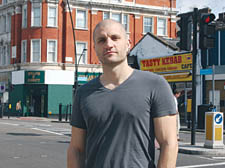|
|
 |
| |

In his real world: one of China Miéville’s books consists of short stories set mainly around a distorted Kilburn High Road |
A weird new tale of two cities
Monsters and aliens, politics and parallel worlds – it’s all in a day’s work for Kilburn-based sci-fi author China Miéville, writes Josh Loeb
CHINA Miéville’s stubborn reluctance to renounce childhood preoccupations is
perhaps the reason for his extraordinary imagination.
“I haven’t shifted mentally one iota in 34 years,” explains the writer, now 36.
“I was obsessed with spaceships and octopuses when I was two and
nothing’s changed.”
Miéville, who has lived in Kilburn since even before he was fixated on sea monsters and extra-terrestrial vessels, may be an unfamiliar name to many. But he is something of a legend in the world of cult sci-fi (or “new weird fiction”, as his particular brand of writing has been called).
In his relatively short career, the novelist, who turns up for our interview wearing earings “cast from real octopus tentacles”, has so far proved himself a prolific and prodigious talent.
He has published a book of short stories set mainly around a distorted version of Kilburn High Road, a novel for young adults about a parallel London, and five other novels, one of which won the Arthur C Clarke Award, a highly respected sci-fi accolade.
His new novel, The City and the City, is, he believes, his most accessible yet to those not normally enthused by “new weird” fiction.
A complex but suspenseful and absorbing book, it is a murder mystery set in a fictional, decaying Eastern European city called Beszél. At first glance it seems like a Chandleresque crime novel – but it contains more than a hint of Miéville’s trademark, otherwordly fantasies.
Unlike a normal city, Beszél is “crosshatched” with, or located in the same space as, another, separate city called Ul Qoma. The two cities have separate bureaucracies – indeed, they are in separate countries – and their residents must carefully “unsee” each other or risk summoning into being a dark, invisible force.
“In my dreams, I’d love it to be shelved under crime,” says Miéville. “With my other books, if I was talking to someone who wasn’t a science fiction or fantasy or horror reader, I would probably not suggest they read them. I meet people who say: ‘I don’t normally read that sort of thing but I’ll read one of your books. Which one should I read?’
“And I always feel like, honestly, none of them. I mean, it’s very kind of you but I don’t really think they’d be appropriate. But with The City and the City, I feel like if you’ve never read any kind of fantasy or science fiction, you wouldn’t be put off.”
If the ideas in some of Miéville’s books might at times seem to carry a slight political whiff, perhaps that is not surprising. In 2001 he stood for election as a candidate for the Socialist Alliance in the constituency of Regent’s Park and Kensington North, gaining 1.2 per cent of the vote.
At the recent Marxism 2009 conference in Holborn, he gave a talk about the cultural history of monsters in fiction, with particular emphasis on the 19th century.
“In the 19th century, monsters became to a large extent decoupled from religion,” he says. “They become more and more polysemic as time goes on.
“Monsters in classical antiquity or in Chaucer tend to have quite specific, narrow meanings. Chaucer for
example mentions a monster which is like a kind of predatory cow with a human face that eats good wives and so it’s always hungry because there aren’t enough good wives – ha ha ha.
“Then, in the 19th or 20th centuries, you get Dracula, who represents what? Predatory sexuality? The sclerotic aristocracy? Monopoly capitalism? He could represent all kinds of things.”
A former sub-editor on
PC Dealer and Computer Reseller Weekly, a trade publication, Miéville began writing novels after completing his undergraduate degree in 1994. He says that, though his political leanings inevitably inform his stories, he hopes they do not do so in a heavy-handed way.
“Obviously its up to readers to judge,” he says. “But it’s never a question of subordination: I’m not trying to write the books for political reasons and to smuggle these through in a slightly skewed police procedural or a story about monsters.
“That’s not my driver, because just as much as I’m a socialist, I’m a science fiction geek. I hope my politics don’t get in the way of someone reading the novel anymore than me being a really, really geeky science fiction fan gets in the way of my politics.”
|
 |
|
 |
 |
|
 |
|


